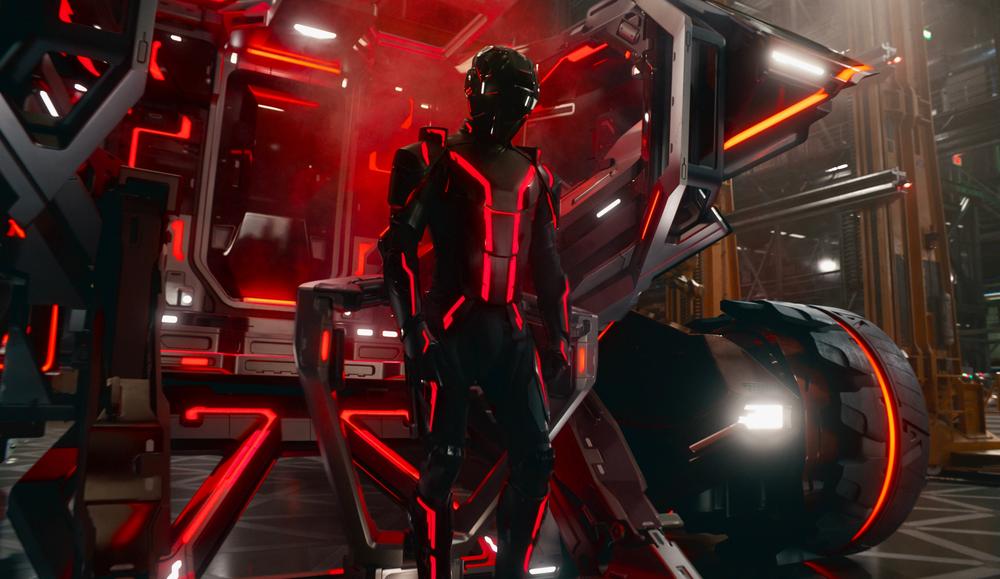Though Tron: Legacy was not a sterling piece of cinema, its gorgeous visuals and a banging score from Daft Punk made it an enjoyable update to the original 1982 cult classic. The movie tried to strike a healthy balance between nostalgic fan service and novel riffs on the source material to make itself feel like an evolutionary step forward for the Tron franchise. Legacy did not quite meet Disney’s lofty box office expectations, but it was successful enough for the studio to keep itself open to the possibility of a sequel.
Tron: Ares is a middling attempt at turning things around and bringing the worlds of programs and users together in a way that’s meant to reflect the rise of artificial intelligence here in our reality. You can see that director Joachim Rønning is trying to deliver on Legacy’s visual spectacle, and in Ares’ score, you can hear Nine Inch Nails working to make the film sound like a moody reflection on life in the age of Silicon Valley tech bros.
But unlike Legacy, which felt like a tech-forward theme park ride, Ares is an uninspired soft reboot that spends much of its time overexplaining a plot that’s as convoluted as it is predictable. Despite having a surprisingly stacked cast (and one very questionable lead performance), the movie doesn’t really know what to do with any of its stars beyond putting them in slick suits and using them to set up another sequel that doesn’t exactly feel like it will or should come to fruition. And while Ares does feature a couple of dazzling set pieces, they are nowhere near enough to justify the price of admission.
Set at some point after the events of Legacy, Tron: Ares introduces a cavalcade of new humans and digital beings whose lives are all tied up in the business dealings of the tech company ENCOM. Though Eve Kim (Greta Lee) is still a game designer at heart, as ENCOM’s CEO, she has become the corporation’s face and dedicated herself to researching how virtual constructs could be manifested in the real world as physical, organic objects. While most of the public thinks of ENCOM as a gaming giant, Eve and her colleagues Seth Flores (Arturo Castro) and Ajay Singh (Hasan Minhaj) see their research as a more important kind of work that could revolutionize the world.
The ENCOM crew wants to use their experimental technology — which looks a bit like 3D printing with lasers — to mass produce food and develop new lifesaving medicines. But over at Dillinger Systems, Eve’s rival, Julian Dillinger (Evan Peters), is hard at work on similar tech that he intends to deploy for military purposes.
When Julian first gives a group of investors a demonstration of his ability to bring the sentient program Ares (Jared Leto) into the real world, the twitchy tech bro is careful to gloss over the fact that his creations’ corporeality only lasts for a few minutes. Julian’s imperious mother, Elisabeth (a criminally underutilized Gillian Anderson), knows that her son is a bit of a fraud. But Julian and Eve know that it might be possible to manifest digital objects that last if they can track down the long-lost Permanence Code originally developed by Kevin Flynn (Jeff Bridges).
In its opening act, as the two sides go hunting across the globe for a MacGuffin, Tron: Ares feels like an unholy blend of the most recent Mission: Impossible and Jurassic World features. Eve, Julian, and Seth speak almost exclusively in quippy exposition dumps that make it seem as if this script does not trust your ability to follow its relatively straightforward plot. It isn’t long before Eve finds the Permanence Code, and Julian sends Ares after her to bring the goods back home. Chases ensue and all hope seems lost. But just when it seems like Ares has the upper hand, his timer runs out, he’s sucked back onto the Dillinger Grid, and Dillinger is forced to start over from square one as if he’s playing a frustrating game in an arcade.
Things are a bit (but only a bit) more interesting in the digital world of Dillinger’s servers where Ares and his second-in-command, Athena (Jodie Turner-Smith, also underutilized), are reborn over and over again after each of their failures to complete missions in the real world. The Grid mostly serves as a menacing backdrop as Ares — portrayed by Leto with an awkward flatness that’s meant to charm, but fails — ponders the meaning of his existence. But the digital world is also where Tron: Ares almost (but not quite) manages to articulate some interesting ideas about how AI companies have become more fixated on building sycophantic servants as opposed to actually developing products that could benefit the masses.
That narrative energy is far less potent in the real world, where Ares becomes more of an unlikely hero as his encounters with Eve leave him increasingly convinced that he’s on the wrong team. Lee and Leto have an inert chemistry that makes the movie’s allusions to a budding romance feel like the wrong choice — especially given that their characters don’t / can’t spend all that much time together. And while both actors do a serviceable job of moving through Ares’ VFX-heavy set pieces on a series of very snazzy-looking Tron™ vehicles, on the whole, the movie’s action is so bland that it seldom feels like anyone is really having fun here.
What’s most baffling is that Disney obviously thinks that people might be hungry for another sequel after these, even though the studio clearly did not have the most confidence in Ares itself. You get the sense from the way that Anderson’s and Cameron Monaghan’s characters are barely part of the story that Disney left quite a bit on the cutting-room floor — perhaps in hopes of streamlining things to make Ares feel more like a reboot than a sequel that had to pick up the last feature’s dangling threads. That might work for people new to this franchise who are coming in with low expectations, but for anyone familiar with what Tron can be when it’s cooking with heat, there isn’t much here worth getting excited about.
Tron: Ares also stars Sarah Desjardins. The movie hits theaters on October 10th.

 iPhone 17/Pro/Max e Air, risolto il bug di download di Apple Intelligence
iPhone 17/Pro/Max e Air, risolto il bug di download di Apple Intelligence